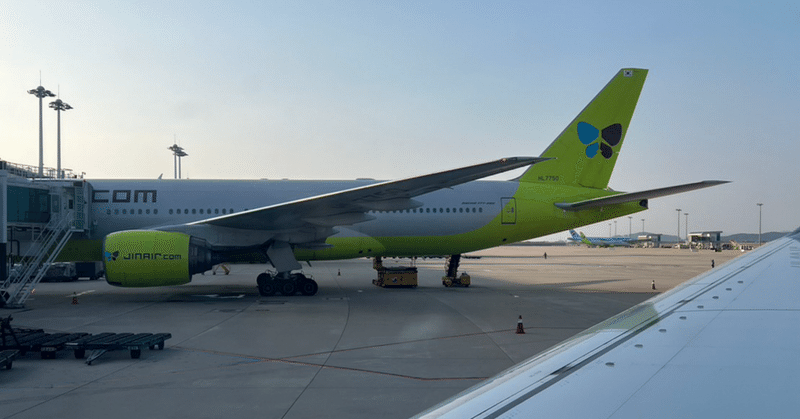
飛行機嫌いの韓国旅行日記/Travel Diary of a Flight-Hater to Korea/비행기를 싫어하는 한국 여행 일기
10/13金曜日から10/15日曜日まで若鯱会韓国サークルの韓国企業視察旅行で韓国を訪れた。感想は後日記載するとして、今回は飛行機嫌いな自分の心の胸の内を明かすのもおもしろいと飛行機内でふと思ったので披露してみたい。
アメリカ留学など海外経験は豊富だが、飛行機は初めから今まで苦手である。何せ、日本の航空会社では1985年の日航ジャンボ機墜落事故以来、日本に離着陸する飛行機は1994年の中華航空140便墜落事故以来、一度も飛行機事故は起こっておらず、ベッドから落ちて死ぬよりも確率が低いのも知っているにも関わらずである。
Up in the Airなどの映画を見てほぼ毎日飛行機に乗っているような人などを見て安心しようとしたり、いかに飛行機は安全のための予防策が施されているかというアメリカ人の友人の飛行機嫌いを克服させた本を読んだりしても今でもやはり飛行機に乗る前と間は緊張する。また、名古屋空港では最後の犠牲者が出た空港だからもう名古屋ではないだろうとかそういうことも考えて安心させたりする。
今回、ジンエアーという韓国の格安航空会社の飛行機を乗り、格安ということが引っかかったのだが、大韓航空系列であるということを知ったり、韓国の義理の兄が全く飛行機は選ばすよく乗る独立系のチェジュ航空よりは財務的には安心できるなどと考えたりする。そして、格安だからと言って飛行機事故が多いということもない印象も付け加えた。先月に8年ぶりに飛行機に乗ったが、コロナの期間にあまり機材が使われなかったから、操縦士の飛行経験も少なくなったから大丈夫かとかも考えたりする。
前回の8月の時は、アシアナに乗ったのだが、最近倒産寸前で大韓航空に吸収合併されることが決まりその財務内容や今後韓国は一社の航空会社でやっていくと競争が無くなるのが心配になったり。実際にアシアナは犠牲者はなかったが広島の空港で着陸の失敗が2015年にあったり、2013年にサンフランシスコでも着陸失敗があり3人の犠牲者があった。だから最近は大韓航空の方が安全に感じるが、大韓航空は北朝鮮の工作員による爆破事故も昔にあったりどっちもどっちなところもある印象もある。ただ、韓国とは個人的につながりが強くなったからそういった事例が目につくだけだとも思う。
ボーイングとエアバスに関する事故を調べてみるとどっちもどっちで大差はないような印象だった。名古屋から仁川を行き来する機材は、大韓航空はボーイング、アシアナはエアバスが多く、今回のジンエアーのものはボーイング737だった。最近はよくわからないがエアバスの方が安心感があるのはよくアシアナに乗っているからだろうか、それともボーイングの事故例をよく調べたことがあるからだろうか。名古屋-仁川ぐらいの短距離路線だと、ボーイング737やエアバスA321など大きくない機体が使われる印象だ。ボーイング737は事故の回数は多いようだがやはりこれは飛んでいる回数にただ比例しているだけなのだろう。
名古屋-仁川間は基本的に快適なイメージも強いが、最近仁川-名古屋間はよく揺れるような気がするのだがそれはやはり最近大きい機材を乗っておらず、使われる機材が小さいからというのもあるだろう。でも揺れると言えば、個人的に日本上空はよく揺れる印象がある。やはり災害が多い国で偏西風の影響もあるのだろうか。一度昔、雪の時に成田からロサンゼルスに向かう大韓航空の飛行機が日本の東の海の乱気流でジェットコースターのように揺れてたまげたことがある。多分、その時からまた飛行機がかなり怖くなってしまったというのもある。日本の中でも特に成田空港周辺は揺れるような印象もある。
その後、2015年のアメリカ生活の最後にサンディエゴからニューヨークに最後の一人旅に行ったり、帰国したり、韓国での結婚式など、5回連続で飛行機に乗る時期があって、初めて子供ができて守る家族も増えたのが手伝ったのか、その時は本当にひどくて、普通は治安とか不安になるのに、ニューヨークに滞在中も飛行機のことばかり考えて気が気でなく旅行の楽しさを消した部分もあった。飛行機に乗っていた時は全く揺れていない時以外ずっと窓を注視して緊張していて、基本眠ることはできないので普通の人より疲労度は高いように思う。飛行機に乗る前も何がソワソワしていて、気づく仲間もいるに違いない。また、1人で乗るよりも誰か知っている人と乗る方が心が落ち着くこともあるがそれはあんまり関係ないとも最近感じる。
今の所の1番の対処策は、もうだめだと初めから諦め切ってしまうか、飛行機に乗る前にお酒を飲むことでだいぶ不安がどうでもよくなり緩和される。ただ、その2015年にたくさん飛行機に乗った時はそのお酒とストレスの影響もあったのかその後痔になってしまい、お酒ばかりに頼るのもいけないとあまり飲まないようになり選択肢は減った。というより、コロナ禍後、機内や荷物検査後の搭乗ロビーではお酒の提供が減ってきて、その方法もできなくなってきた。結局、そんな心配しても本当に大事なことがなおざりになるのが悪いことなのか、逆にその重要と思われるということも偏見でその心配がなくなっていいことなのか。
今回のジンエアーでは名古屋からの行きはまぁまぁ揺れたのか機長もシートベルトのサインを出したり出さなかったり落ち着きがない様子で着陸も地面の走行期間が長く粗かったように感じた一方、仁川からの帰りは、離陸前の安全対策の説明が行きより長かったのが少し不安だったが、シートベルトのサインもそれほど出さずに着陸も少しずつ高度を下げていって上手だったように思った。
何か最近では機長のアナウンスするタイミングや声のトーンで落ち着いたいい機長かがわかるようになってきたとも感じる。だいたい乗客を安心させる機長はアナウンスするタイミングや声が絶妙で乗客を安心させるような気がする。そんな時は大体揺れも小さく、たぶん気流も良い所を選ぶなど気遣いが大きいか経験もあるのだろうと予測する。そして、着陸した瞬間一気に緊張が溶けるのだが、そんな機長が操縦する飛行機に乗って着陸した時はSmartでCoolな機長にFall in Loveをしてしまうような気持ちにもなる。
そして、こんなに何回も乗っているし、知識もつけたのになぜ緊張するのか考えてみた。それはもう、あの電車に乗るよりも手荷物検査に代表される大袈裟な搭乗機手続きや事故の時の大きな報道などによるイメージの問題でしかない。そして、それをもっとも助長するのがテロや羽が折れたらどうしようとか飛行機の故障など最悪のことを想像してしまうということである。また、不可抗力もなく、もし事故にあって死んだら今までやってきたことも水の泡になると思ってしまう。これはもうイメージによるもので、何かコロナの報道で国民が一気にコロナに気をつけなければと過剰反応したような現象に近いものがあるとも感じたのだ。
日本からロサンゼルスまで1時間以内にロケットのような技術で飛んでいける乗り物が開発されているというニュースを見たが、つい最近まではそういう乗り物が早くできたらなぁとかも考えていた。それまでは待てないし、逆に世界が近くなりすぎるのも、会いたくない人にすぐ会うようになったりして嫌だったりとか考えてみたり。
こんなに考えてしまうのは自分だけだと思っていたのたが意外にも韓国の人などでも周りにいて、女性で飛行機が怖いというのは稀であり、そのほとんどが男性である。実はと言うと、そういった飛行機嫌いな人が多くても安心を増やすことは全くなくどちらかというと気にしない人が周りには多くいてくれたほうが安心する。今回、隣の席にあまり飛行機が好きでない人が座って逆に少し緊張させられた。
そのアメリカ人の友人に勧められた本には、飛行機は何重にも安全対策が施されていると書いてあり、検査の頻度も多く、せいぜい一年に一回しか検査を受けない車に乗るよりも全く安心だということを言っていた。そして、機長やキャビンアテンダントさんはほぼ毎日の頻度で飛行機に乗っているし、バスのように考えればいいとかも考えて安心させたりする。また、ロケットで宇宙旅行に行った前澤さんとかを見ると飛行機を乗ることについて励まされるし、自分がちっぽけに見えてしまうが、もうこれはしょうがないのだと諦めてもうそう心配するしかないとも考えている。
ただ、もう今は歳もとってきて生への執着も小さくなってきたのか、地震があったりする地上にいるのがリスクが小さいわけでもなく、本当は交通事故や病気で死ぬ方が確率的には高いとよく思うようにしているのか、飛行機に乗る日しか心配しなくなった、そして旅行中も目一杯楽しめるようになったのは、飛行経験のおかげで、前進なのかもしれない。やっぱり絶対的に様々な飛行機に乗った経験が少ないか、まだまだ暇で余計なことを考える時間が多いというのもあるのかもしれない。だからどんどん忙しくしていきたいとも思っている。
そもそもあまりライセンスの取得がそれほど難しくないタクシーに乗ったり、誰か知り合いか知り合いでない人の運転で車に乗せてもらうほうがよっぽど危なく、飛行機に乗っている時の方が、手荷物検査を受けており攻撃されるリスクも小さく最も安全な場所である。飛行機は浮力によるバランスで飛んでおり上から吊るされているようなイメージで、地上が安全だというのも偏見だ。
そんなこんなだが、飛行機にたくさん乗るのはやっぱり、挑戦したいという気持ちと、その場所に行きたいと思うことが勝ること、そして、飛行機にたくさん挑戦していつか克服したいと思っているからと分析する。そして、飛行機嫌いでない人よりいいことではないけど、飛行機嫌いのおかげで、物理のことを調べてみたり、飛行機について詳しくなったという若干のメリットというのもある。
来月にはまた研修旅行で今度は県営名古屋空港からフジドリームエアラインに乗って旅行に行く計画がある。フジドリームエアラインはブラジルのエンブラエル社製の機材が使われていて、よく聞く飛行機メーカーでないのは不安だが、日本の航空会社の慎重さが安心感を与えるというのもある。
今回で格安航空会社を経験に加えたし、次はマイナーな飛行機会社の経験を加えて、今後は特別不安視される航空会社でない限り全ての航空会社をトライしていき、どんどん経験を増やしていって飛行機嫌いを克服するという淡い期待を抱きながらも、どんどん飛行機に乗っていこうと考えている。行動による経験に勝るものはないからである。
10/13 금요일부터 10/15 일요일까지 와카샤치회 한국 서클의 한국 기업 시찰 여행으로 한국을 방문했다. 소감은 추후에 기재하기로 하고, 이번에는 비행기를 싫어하는 나의 속내를 털어놓는 것도 재미있을 것 같아서 비행기 안에서 문득 생각나서 공개해 본다.
미국 유학 등 해외 경험은 많지만, 비행기는 처음부터 지금까지도 잘 타지 못한다. 어쨌든 일본 항공사에서는 1985년 닛코 점보기 추락사고 이후 일본에 이착륙하는 비행기는 1994년 중화항공 140편 추락사고 이후 단 한 번도 비행기 사고가 일어나지 않았고, 침대에서 떨어져 죽는 것보다 확률이 낮다는 것을 알고 있음에도 불구하고 말이다.
Up in the Air와 같은 영화를 보고 거의 매일 비행기를 타는 사람들 등을 보며 안심하려고 노력하거나, 미국인 친구의 비행기 혐오증을 극복하게 해준 책에서 비행기가 얼마나 안전을 위한 예방책이 마련되어 있는지를 읽어도 여전히 비행기를 타기 전과 중간에는 긴장을 하게 된다. 또 나고야 공항에서는 마지막 희생자가 나온 공항이니까 더 이상 나고야는 아니겠지, 그런 생각으로 안심시키기도 한다.
이번에 진에어라는 한국 저가항공사의 비행기를 타게 되었는데, 싸다는 것이 마음에 걸렸지만, 대한항공 계열이라는 것을 알게 되거나, 한국의 처남이 비행기를 전혀 타지 않는 독립계인 제주항공보다는 경제적으로 안심할 수 있을 것 같다는 생각을 하기도 한다. 그리고 저렴하다고 해서 비행기 사고가 많지는 않다는 인상도 덧붙였다. 지난달에 8년 만에 비행기를 탔는데, 코로나 기간 동안 기재를 많이 사용하지 않아 조종사의 비행 경험도 적어져서 괜찮을까 하는 생각도 해본다.
지난 8월에는 아시아나를 탔는데, 최근 부도 직전에 대한항공에 흡수합병이 결정되어 그 재무상황이나 앞으로 한국은 한 항공사로 가면 경쟁이 없어질까봐 걱정이 되기도 했다. 실제로 아시아나항공은 피해자는 없었지만 2015년 히로시마 공항에서 착륙 실패가 있었고, 2013년에는 샌프란시스코에서도 착륙 실패로 3명의 희생자가 있었다. 그래서 요즘은 대한항공이 더 안전하다고 느끼지만, 대한항공은 예전에 북한 공작원에 의한 폭파사고도 있었고, 둘 다 어느 정도 비슷한 면이 있다는 인상도 있다. 다만 한국과는 개인적으로 유대감이 강해졌기 때문에 그런 사례들이 눈에 띄는 것일 뿐이라고 생각한다.
보잉과 에어버스 관련 사고를 조사해보니 둘 다 큰 차이가 없는 것 같았다. 나고야에서 인천을 오가는 항공기는 대한항공은 보잉, 아시아나항공은 에어버스가 많은데, 이번 진에어는 보잉 737이었다. 요즘은 잘 모르겠지만 에어버스가 더 안심되는 것은 아시아나를 자주 타봐서인지, 아니면 보잉의 사고 사례를 많이 접해서인지 모르겠다. 나고야-인천 정도의 단거리 노선이라면 보잉 737이나 에어버스 A321 등 크지 않은 기종을 사용하는 것 같다. 보잉 737은 사고 횟수가 많은 것 같지만 역시 이것은 비행 횟수에 비례하는 것일 뿐이다.
나고야-인천 간은 기본적으로 쾌적한 이미지도 강하지만, 최근 인천-나고야 간은 자주 흔들리는 것 같은 느낌이 드는데, 그건 역시 최근 큰 기종을 타지 않고, 사용하는 기종이 작아서 그런 것도 있을 것이다. 하지만 흔들린다고 하면 개인적으로 일본 상공은 잘 흔들린다는 인상을 받는다. 역시 재난이 많은 나라에서 편서풍의 영향도 있는 걸까. 예전에 눈이 왔을 때 나리타에서 로스앤젤레스로 가던 대한항공 비행기가 일본 동쪽 바다의 난기류로 인해 롤러코스터처럼 흔들려서 당황한 적이 있다. 아마 그때부터 다시 비행기가 상당히 무서워진 것도 있을 것이다. 일본에서도 특히 나리타 공항 주변은 흔들리는 듯한 인상도 있다.
그 후 2015년 미국 생활 마지막에 샌디에이고에서 뉴욕으로 마지막 혼자 여행을 다녀오거나 귀국, 한국에서의 결혼식 등 5번 연속으로 비행기를 타는 시기가 있었고, 처음으로 아이가 생겨서 지켜야 할 가족도 늘어난 것이 도움이 되었는지, 그때는 정말 심해서 평소에는 치안이나 불안에 되는데, 뉴욕에 머무는 동안에도 비행기 생각만 하다 보니 신경이 쓰여 여행의 즐거움을 잃어버린 부분도 있었다. 비행기를 타고 있을 때는 전혀 흔들리지 않을 때를 제외하고는 계속 창밖을 쳐다보며 긴장하고, 기본적으로 잠을 못 자서 피로도가 보통 사람보다 높은 것 같다. 비행기를 타기 전에도 뭔가 소란스러워서 눈치채는 동료도 있을 것 같다. 또 혼자 타는 것보다 아는 사람과 함께 타는 것이 마음이 편할 때도 있지만 그건 별 상관이 없다는 것을 요즘 느낀다.
현재로서는 가장 좋은 대처법은 처음부터 안 된다고 포기하거나, 비행기를 타기 전에 술을 마시면 불안감이 많이 사라지고 완화되는 것 같다. 다만 그 2015년도에 비행기를 많이 탔을 때 그 술과 스트레스의 영향도 있었는지 그 후 치질이 생겨서 술에만 의존하는 것도 안 되겠다 싶어 술을 잘 마시지 않게 되면서 선택지가 줄었다. 오히려 코로나 사태 이후 기내나 수화물 검사 후 탑승 로비에서 술 제공이 줄어들어 그 방법도 없어졌다. 결국 그런 걱정 때문에 정말 중요한 것이 소홀해지는 것이 나쁜 일인지, 아니면 반대로 그 중요하다고 여겨지는 것이 편견으로 그 걱정이 없어지는 것이 좋은 일인지.
이번 진에어에서는 나고야에서 가는 길은 그럭저럭 흔들렸는지 기장도 안전벨트 사인을 내리고 안 내리고 안절부절못하는 모습에 착륙도 지상 주행 기간이 길고 거칠게 느껴진 반면, 인천에서 돌아오는 길은 이륙 전 안전대책에 대한 설명이 가는 길보다 더 길어 조금 불안했지만, 안전벨트 표시도 별로 하지 않고 착륙도 조금씩 고도를 낮추면서 잘하는 것 같았다.
왠지 요즘은 기장의 안내방송 타이밍이나 목소리 톤으로 좋은 기장인지 아닌지 알 수 있게 된 것 같다는 느낌도 든다. 대체로 승객을 안심시키는 기장은 안내방송을 하는 타이밍이나 목소리가 절묘하게 승객을 안심시키는 것 같다. 그럴 때는 대체로 흔들림도 적고, 아마도 기류가 좋은 곳을 고르는 등 배려가 크거나 경험이 많을 거라고 예측한다. 그리고 착륙하는 순간 긴장이 단숨에 풀리는데, 그런 기장이 조종하는 비행기를 타고 착륙할 때면 Smart하고 Cool한 기장에게 Fall in Love를 하게 되는 것 같기도 하다.
그리고 이렇게 여러 번 탔고, 지식도 쌓았는데 왜 긴장하는지 생각해 보았다. 그것은 이제 그 기차를 타는 것보다 수하물 검사로 대표되는 과장된 탑승수속과 사고 시 큰 보도 등으로 인한 이미지의 문제일 뿐이다. 그리고 그것을 가장 부추기는 것은 테러나 날개 부러지면 어쩌나, 비행기 고장 등 최악의 상황을 상상하게 되는 것이다. 또 불가항력도 아니고, 만약 사고로 죽으면 지금까지 해온 일이 물거품이 될 거라고 생각하게 된다. 이것은 이미 이미지에 의한 것으로, 마치 코로나 보도로 국민들이 한꺼번에 코로나를 조심하지 않으면 안 된다고 과민반응을 보인 것과 비슷한 현상이라고도 느꼈다.
나만 이런 생각을 하는 줄 알았는데 의외로 한국 사람 등 주변에서도 비행기를 무서워하는 여성은 드물고 대부분 남성이었다. 사실 그런 비행기를 싫어하는 사람이 많다고 해서 안심할 수 있는 것은 전혀 아니며 오히려 신경 쓰지 않는 사람이 주변에 많으면 더 안심할 수 있다. 이번에 옆자리에 비행기를 별로 좋아하지 않는 사람이 앉아서 오히려 조금 긴장했다.
그 미국인 친구가 추천해준 책에는 비행기는 여러 겹의 안전장치가 되어 있고, 검사 빈도도 많아 기껏해야 1년에 한 번 검사하는 자동차를 타는 것보다 훨씬 안심할 수 있다고 했다. 그리고 기장이나 승무원들은 거의 매일 비행기를 타고 다니며, 버스처럼 생각하면 된다며 안심시켜 주기도 한다. 또 로켓으로 우주여행을 다녀온 마에자와 씨 등을 보면 비행기를 타는 것에 대해 용기를 얻기도 하고, 자신이 초라해 보이지만, 이제 이건 어쩔 수 없는 일이라고 포기하고 더 이상 그렇게 걱정할 수밖에 없다고 생각한다고도 한다.
다만 이제는 나이를 먹어감에 따라 생명에 대한 집착도 줄어들었는지, 지진이 일어나기도 하는 지상에 있는 것이 위험이 적은 것도 아니고, 사실 교통사고나 질병으로 죽을 확률이 더 높다고 자주 생각하게 되었는지, 비행기를 타는 날만 걱정하게 되었고, 그리고 여행 중에도 마음껏 즐길 수 있게 되었다. 있게 된 것은 비행 경험 덕분에 발전한 것일지도 모른다. 역시 절대적으로 다양한 비행기를 타본 경험이 적어서인지, 아니면 아직은 시간이 남아돌아 쓸데없는 생각을 할 시간이 많아서인지도 모르겠다. 그래서 점점 더 바빠지고 싶은 마음도 있다.
애초에 면허 취득이 그리 어렵지 않은 택시를 타거나 아는 사람이나 모르는 사람이 운전하는 차에 타는 것이 훨씬 더 위험하고, 비행기를 탈 때보다 수하물 검사를 받고 공격당할 위험도 적고 가장 안전한 장소다. 비행기는 부력에 의한 균형으로 날아가고 위에서 매달려 있는 듯한 이미지로 지상이 안전하다는 편견도 있다.
그럼에도 불구하고 비행기를 많이 타는 것은 역시 도전하고 싶은 마음과 그 장소에 가고 싶은 마음이 앞서고, 비행기에 많이 도전해서 언젠가 극복하고 싶은 마음이 크기 때문이라고 분석한다. 그리고 비행기를 싫어하지 않는 사람보다 좋은 것은 아니지만, 비행기를 싫어하는 덕분에 물리학에 대해 알아보고, 비행기에 대해 더 잘 알게 되었다는 약간의 장점도 있다.
다음 달에는 또다시 연수여행으로 이번에는 현영 나고야공항에서 후지드림항공을 타고 여행을 갈 계획이 있다. 후지드림항공은 브라질의 엠브라에르사의 기재를 사용하는데, 자주 듣던 비행기 제조사가 아니라서 불안하지만, 일본 항공사의 신중한 태도가 안심감을 주는 것도 있다.
이번에 저가 항공사를 경험에 추가했고, 다음에는 마이너 항공사의 경험을 추가하고, 앞으로는 특별히 불안한 항공사가 아니라면 모든 항공사를 시도해보고, 점점 경험을 늘려가면서 비행기 혐오증을 극복할 수 있을 것이라는 희미한 기대를 품고 점점 비행기를 타볼 생각이다. 하고 있다. 행동으로 경험하는 것만큼 좋은 것은 없기 때문이다.
From Friday, October 13th to Sunday, October 15th, I visited Korea as part of a business trip to Korea by the Wakashachi-kai Korea Circle. I will write about my impressions of the trip later, but this time I would like to share my thoughts on the plane, as I suddenly thought it would be interesting to reveal my inner thoughts about my dislike of airplanes.
Although I have had plenty of overseas experience, including studying abroad in the U.S., I have always been uncomfortable with airplanes. I know that the probability of dying from a plane crash is lower than falling out of bed, but I have never had a plane crash on a Japanese airline since the Japan Airlines jumbo jet crash in 1985 and the China Airlines Flight 140 crash in 1994.
Even though I watch movies like Up in the Air and try to reassure myself by watching people who fly almost every day, and even though I read a book that helped an American friend overcome his dislike of flying by explaining how airplanes are equipped with safety precautions, I still get nervous before and during my flight. I also try to reassure myself by thinking about the last casualty at Nagoya airport, so I know it will not be Nagoya again.
This time, I flew with Jin Air, a low-cost airline from South Korea. The low-cost price of the airline made me nervous, but I learned that it is affiliated with Korean Air, and I thought that it was financially safer than JEJU AIR, an independent airline that my brother-in-law in South Korea often flies, although he never chooses to fly. I also added that I had the impression that just because it is a low-cost airline, it does not mean that there are many airplane accidents. Last month I flew for the first time in eight years, and I wondered if it would be all right because the aircraft had not been used much during the Korona period and the pilots had less experience in flying.
The last time I flew Asiana in August, it was on the verge of bankruptcy and was about to be merged into Korean Air, and I was concerned about its financial condition and the lack of competition if Korea goes with one airline in the future. Asiana actually had no casualties, but there was a landing failure at the airport in Hiroshima in 2015, and there was also a landing failure in San Francisco in 2013 that killed three people. So, I feel Korean Air is safer these days, but Korean Air had a bombing accident by a North Korean agent in the past, and I have the impression that both sides have their own problems. However, I think that such cases are only noticeable because of my strong personal ties with South Korea.
When I looked into the accidents involving Boeing and Airbus, I got the impression that there was not much difference between the two. Korean Air's planes flying between Nagoya and Incheon are mostly Boeing, Asiana's are Airbus, and Jin Air's were Boeing 737s. I am not sure about these days, but I feel more comfortable with Airbus, perhaps because I often fly Asiana, or perhaps because I have often studied Boeing's accident cases. For short-haul routes, such as Nagoya-Incheon, I have the impression that less large aircraft such as Boeing 737s and Airbus A321s are used. The Boeing 737 seems to have more accidents, but I guess this is just in proportion to the number of times it flies.
The flight between Nagoya and Incheon has a strong image of being basically comfortable, but I have the impression that the flight between Incheon and Nagoya has been shaking a lot recently, and this is probably due to the fact that I have not flown on larger aircraft recently and the aircraft used are smaller. However, speaking of shaking, I personally have the impression that the airspace over Japan is often shaken. This may be due to the prevailing westerly winds in a country that is prone to frequent disasters. Once, when it was snowing, a Korean Air flight from Narita to Los Angeles was so shaken by the turbulence in the sea east of Japan that it was like a roller coaster ride. Perhaps it was partly because since then I have become quite afraid of airplanes again. I also have the impression that the area around Narita Airport is especially bumpy in Japan.
Then, at the end of my life in the U.S. in 2015, there was a period when I flew five times in a row, including my last solo trip from San Diego to New York, returning home, and a wedding in Korea, and I guess it helped that I had a child for the first time and an extended family to protect, but at that time it was really bad, and I was usually worried about security and such. I was so anxious about security and other things, but I was thinking about airplanes all the time during my stay in New York, and it took some of the fun out of the trip. When I was on the plane, I was always staring at the window and tense, except when the plane was not shaking at all, and I was basically unable to sleep. I am sure some of my fellow passengers must have noticed what a swaying feeling I had even before boarding the plane. I also feel that sometimes it is more relaxing to fly with someone you know than to fly alone, but I feel that this is not really relevant these days.
The best way to deal with it for now is to just give up, or have a drink before the flight, and that will help alleviate a lot of the anxiety. However, when I flew a lot in 2015, I got hemorrhoids afterwards, probably due to the alcohol and stress, so I decided not to rely on alcohol all the time and stopped drinking as much. Rather, after the Corona disaster, alcohol was offered less and less on board and in the boarding lobby after baggage check, and I could no longer do it that way. In the end, is it a bad thing to worry about such things and neglect what is really important, or conversely, is it a good thing that that supposed importance is also a prejudice that eliminates that worry?
On the other hand, on the return trip from Incheon, the explanation of safety measures before takeoff was longer than on the way to Nagoya, which made me a little uneasy, The return flight from Incheon, on the other hand, seemed to be a little uneasy because the safety briefing before takeoff was longer than the flight to Incheon.
Recently, I feel that it has become possible to tell whether a captain is a good and calm captain by the timing of his announcements and the tone of his voice. I feel that a captain who makes passengers feel at ease usually makes passengers feel at ease with his exquisite timing and voice. In such cases, the shaking is usually small, and the captain is probably very attentive and experienced, perhaps choosing a location with good airflow. When you land on a plane piloted by such a captain, you feel as if you are falling in love with the captain, who is smart and cool.
And then I thought about why I was nervous even though I have been on the plane so many times and have gained knowledge. It's just a matter of image now, due to the exaggerated boarding plane procedures represented by the baggage check and the big media coverage of the accident, rather than riding that train. And the thing that contributes to it the most is that we imagine the worst, such as terrorism or what if a wing breaks or the plane breaks down. Also, if there is no force majeure and they die in an accident, they think that everything they have done will be for naught. I felt that this was already a result of imagery, similar to the way the public overreacted to the news of the Corona disaster, urging people to be careful of it.
I thought I was the only one who thought like this, but surprisingly, there are people in Korea who are afraid of airplanes, and it is rare to find women who are afraid of airplanes, and most of them are men. In fact, having many people who don't like flying doesn't make me feel safer at all. This time, I was a little nervous because there was a person sitting next to me who did not like airplanes very much.
The book recommended by the American friend said that airplanes have many layers of safety measures and are inspected frequently, which is totally safer than flying in a car, which is inspected only once a year at most. And the captain and cabin attendants fly almost every day, and they also reassure us by thinking that we should think of it like a bus. He also thinks that when he sees people like Mr. Maezawa, who went on a space trip in a rocket, he is encouraged about flying, and although he looks tiny, he also thinks that he has to give up and worry about this no more, because it can't be helped.
But now that I am getting older, my attachment to life is getting smaller, and I often think that being on the ground, where there are earthquakes, is not a small risk, and that it is actually more probable that I will die in a car accident or from illness, I no longer worry only about the day I fly, and I can enjoy myself to the fullest during the trip. Maybe it is the flight experience that has allowed me to make progress. It may be that I still have absolutely little experience flying in a variety of airplanes, or it may be that I still have a lot of free time and a lot of time to think about unnecessary things. So I also want to keep myself busier and busier.
It is much more dangerous to take a cab, which is not so difficult to get a license for, or to get a ride in a car driven by someone you know or don't know, and flying on an airplane is the safest place to be, as you are subjected to baggage checks and the risk of being attacked is small. It is also prejudiced to think that airplanes are safe on the ground, as they fly on buoyancy balance and are suspended from above.
Despite this, he analyzes that the reason he flies a lot is because he still wants to challenge himself, that he wants to go to the place, and that he wants to overcome the challenge of flying a lot and overcome it someday. And there is also the slight advantage of not hating airplanes, which is not better than people who don't hate airplanes, but it has allowed me to look into physics and learn more about airplanes.
Next month, I plan to go on another study trip, this time on Fuji Dream Airlines, this time from the prefectural Nagoya airport. Fuji Dream Airline uses aircraft manufactured by Embraer, a Brazilian company, which is not a well-known aircraft manufacturer, which makes me uneasy, but the cautiousness of Japanese airlines gives me a sense of security.
Now that I have added a low-cost airline to my experience, I will add a minor airline to my experience, and from now on, I will try all airlines unless I am particularly anxious about them, and I plan to fly more and more with the faint hope that I will gain more and more experience and overcome my dislike of flying. I am thinking of flying more and more with the faint hope that I will gain more experience and overcome my dislike of flying. I will continue to fly more and more with the faint hope that I will gain more and more experience and overcome my dislike of flying.
#飛行機 #名古屋#仁川#大韓航空#ジンエアー#チェジュ航空#飛行機恐怖症
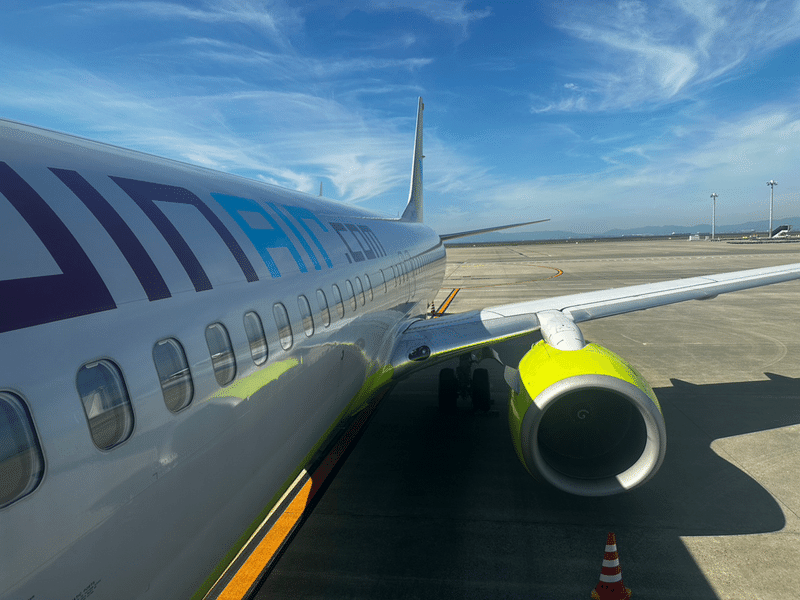
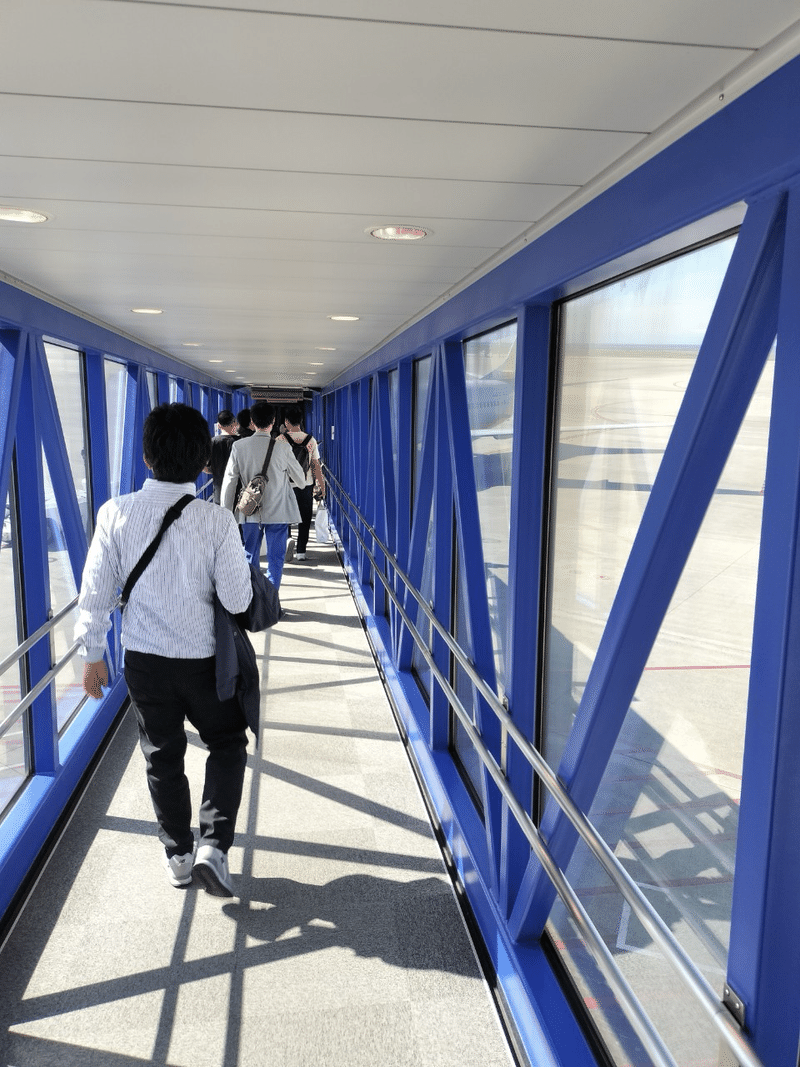
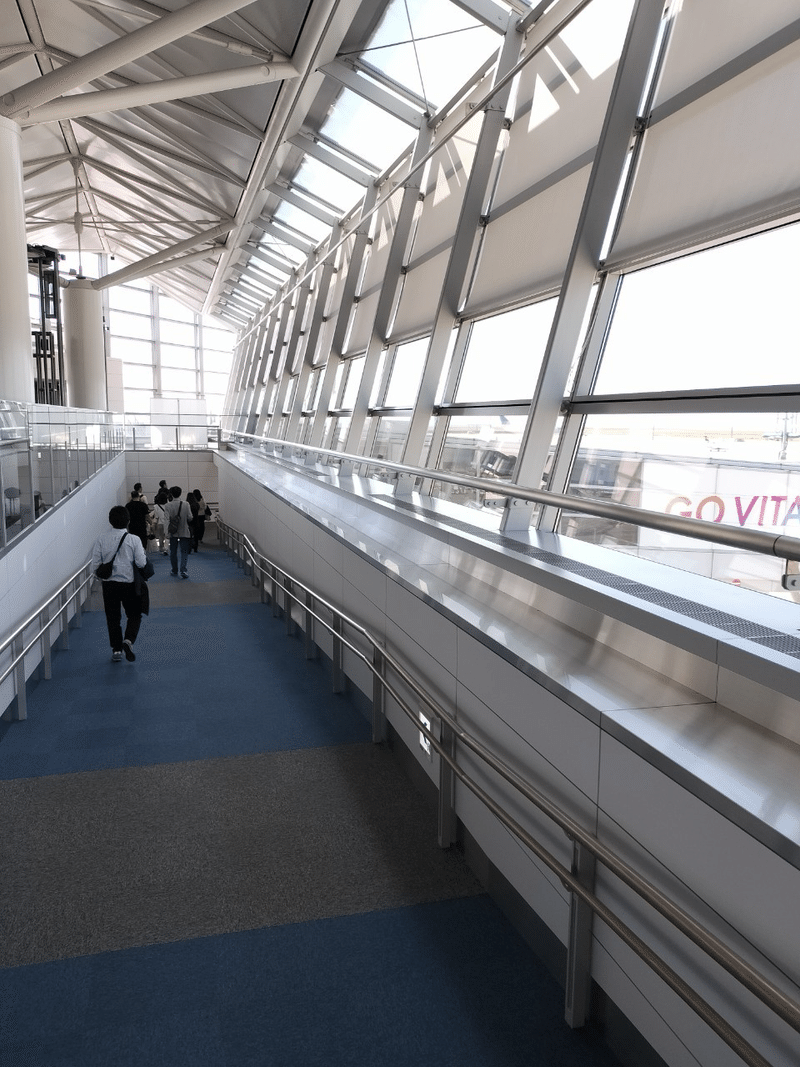
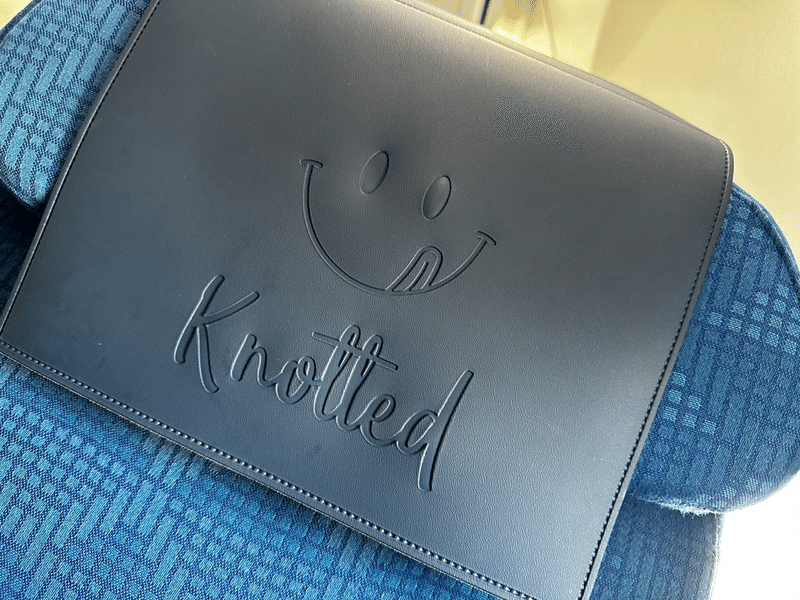
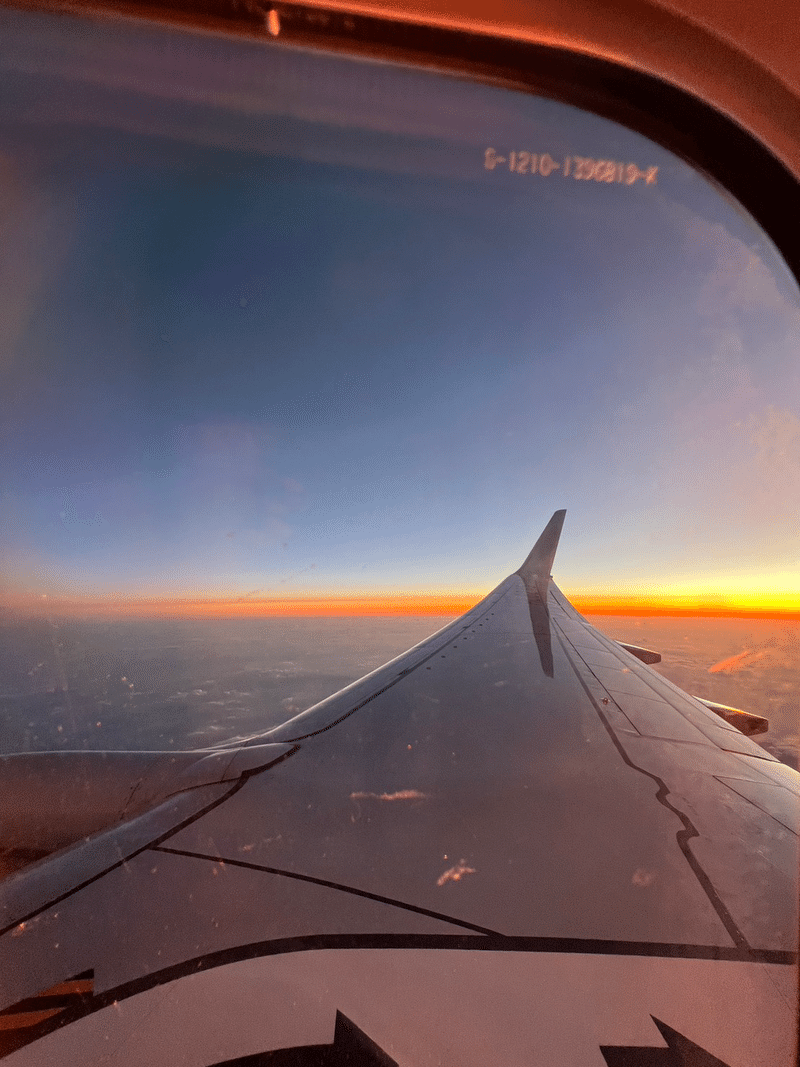
この記事が気に入ったらサポートをしてみませんか?
